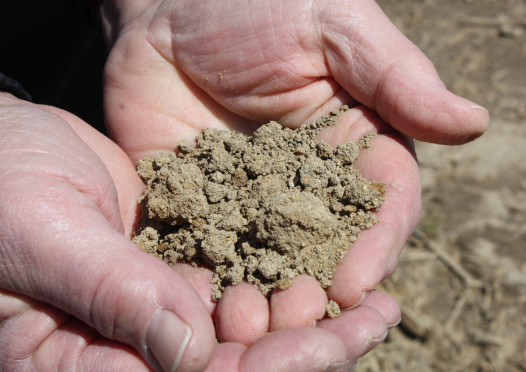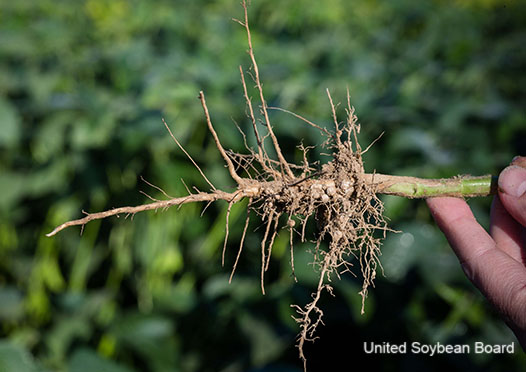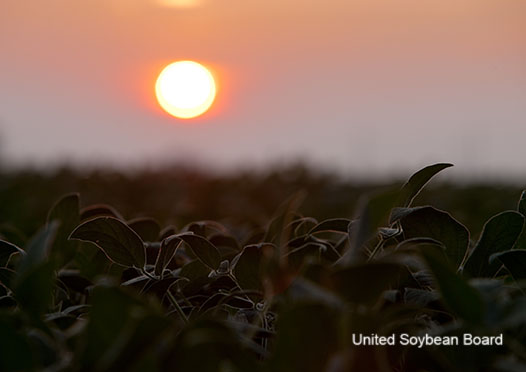ILSOYADVISOR POST
Nitrogen on the Soybeans Yield Gap
Is some of the yield gap we see in soybeans today due to a lack of nitrogen?
For the past 4 or 5 years we have been hearing a lot about applying nitrogen (N) on soybeans and we still don’t have a clear direction. Sometimes it works and sometimes it doesn’t. And we still don’t have a clear idea of the best timing, form or amount to apply and until we do, guaranteeing a return on investment isn’t very likely.
We do know a couple things, though:
- High yields greater than 70, 80 or 90 bu/A may need a shot of N, depending on the soil and residual N
- Apply 30 to 40 lbs./A at the time of planting, especially early planting, or a wet spring will hold the plant over until N-fixation kicks in in mid-June
- Light soils or soils low in organic matter will not mineralize enough N to supplement natural N fixation when yield potential is high
- At some yield level—depending on the season, soil texture and organic matter, yield potential and biological fixation—fixation and soil N supply will not meet the crop’s N requirements
The International Plant Nutrition Institute (IPNI) published their take on “Nitrogen and the Soybean Yield Gap, “authored by agronomist Mike Stewart, Director, North American Program. You can read the full article here.
Stewart said, “The same work determined that 50 to 60 percent of soybean N demand was met by biological fixation, with remainder of the crop’s N need supplied by soil reserves. Soybean may generally be considered neutral in relation to its contribution of N to the soil, but at high yields negative N balances (removing soil’s natural supply of N—Davidson) can be expected.”
Soybean seed yield is directly related to nitrogen uptake by the plant. Balboa GR, et al. 2017. Crop Sci https//doi.org/10.2135/cropsci2017.06.0349
Stewart explained that the question of whether to apply N to soybeans is more complex than yield potential and involves weather, soil factors (nitrate and mineralizable N), genetics, soil’s natural and resident N-fixing bacteria (different from bradyrhizobia) and ability of the nodules to supply N to the plant.
He advocated that we need a better understanding of soybean biological N-fixation in the field and in real time and tools that can look at the interaction of the above factors and the soybean’s ability to supply its own N, soil’s ability to provide N and when supplementing N makes sense. Soybean scientist Ignacio Ciampitti is validating the new ureide test to assess whether N fixation in the field is low, moderate or high.
We have posted many articles on N on soybeans exploring all aspects of this topic. And ISA did fund a project looking at soil’s ability to supply N and the soybean’s response to N in different forms and timing. But the project lacked the ability to assess biological fixation, which makes the research being conducted by Dr. Ciampitti crucial to our understanding of when to apply N on beans in the future.
Past articles posted on the ILSoyAdvisor.
http://ilsoyadvisor.com/diagnostics/2014/july/2014-perfect-storm-for-n-deficiency-in-soybeans/
http://ilsoyadvisor.com/diagnostics/2015/may/n-on-beans-a-different-perspective/
http://ilsoyadvisor.com/agronomy/2015/december/soybeans-responses-to-nitrogen-unpredictable/
http://ilsoyadvisor.com/plant-and-soil-health/2016/march/soybeans-and-nitrogen-cycling/
http://ilsoyadvisor.com/agronomy/2017/october/nitrogen-on-soybeans-here-is-what-we-know/
Recent webinar presented by Fred Below and Tim Smith on the ILSoyAdvisor.
http://ilsoyadvisor.com/agronomy/2018/february/webinar-what-we-ve-learned-from-nitrogen-on-beans-research/
Until we get a grip on estimating biological N-fixation in the field, and predicting yield potential and N-mineralization with some degree of certainty, we will not be able to develop a recommendation on when to apply nitrogen—what time, what form or how much.
Soybean agronomist Daniel Davidson, Ph.D. posts blogs on agronomy-related topics. Feel free to contact him at djdavidson@agwrite.com or ring him at 402-649-5919.





Comments
Add new comment